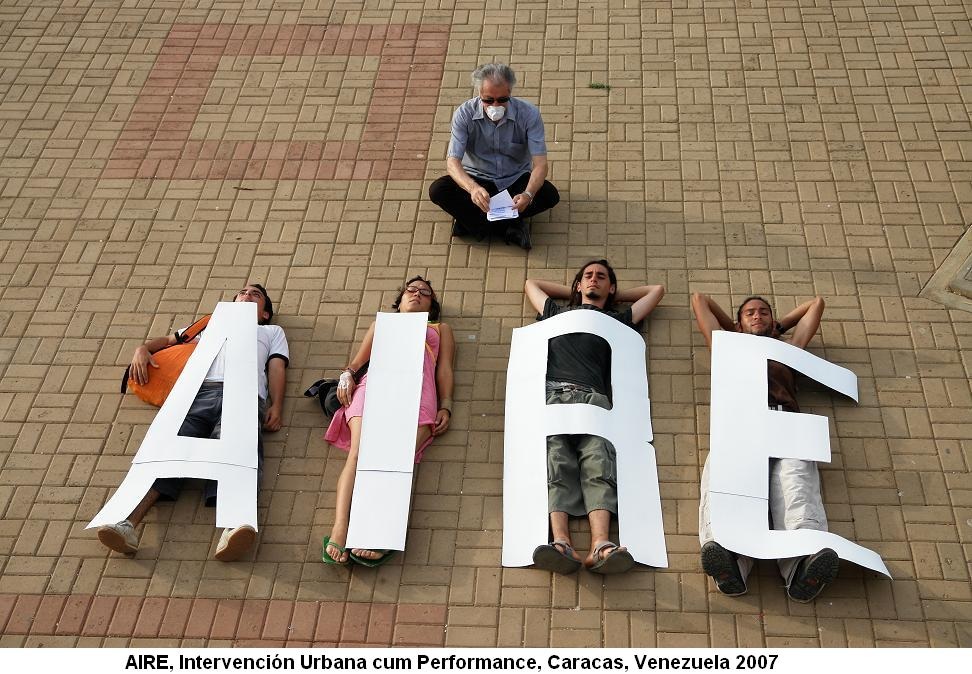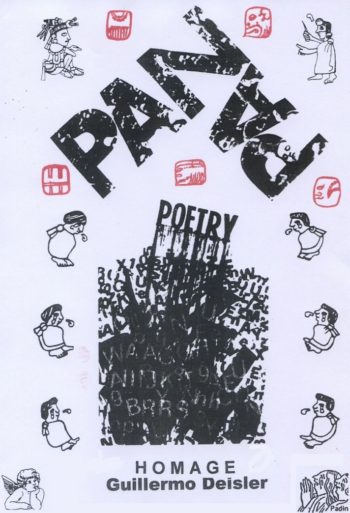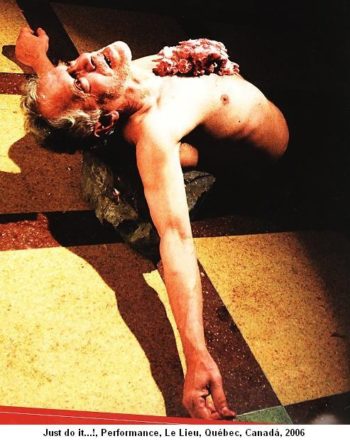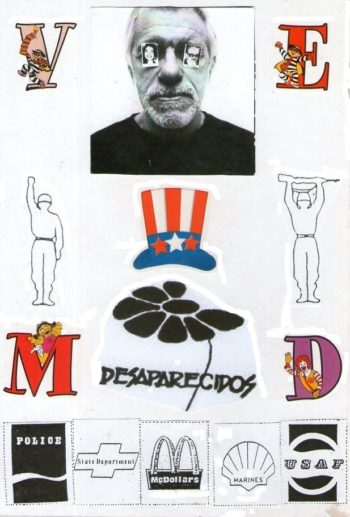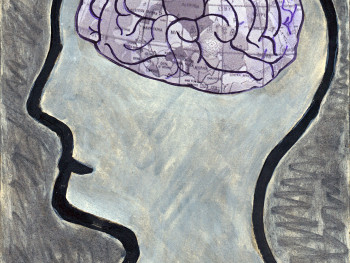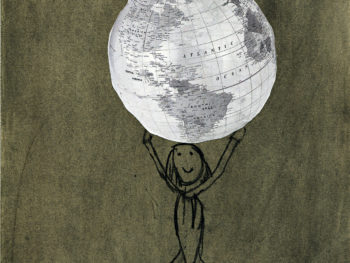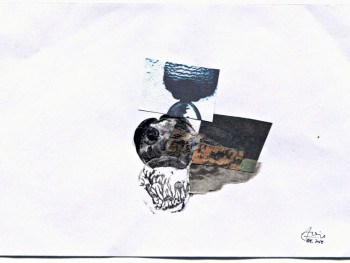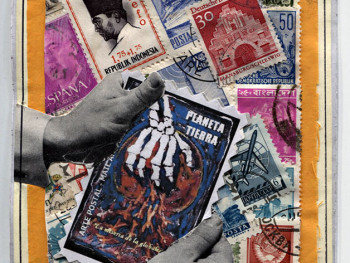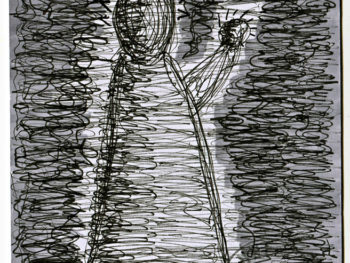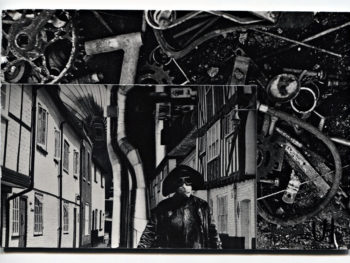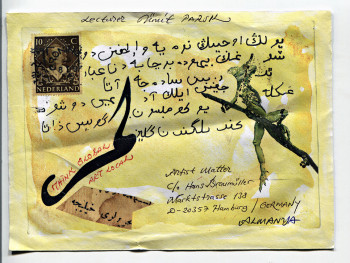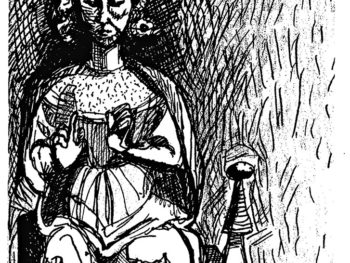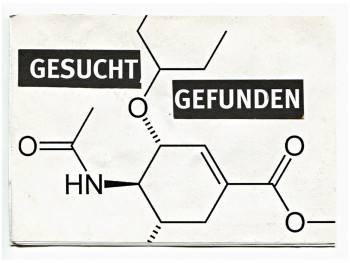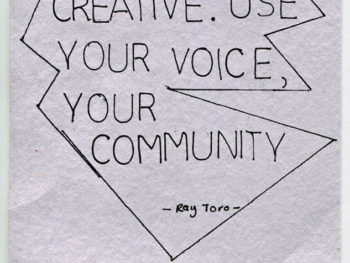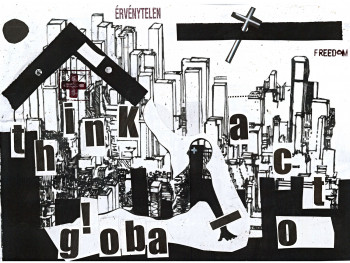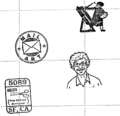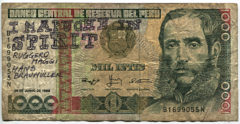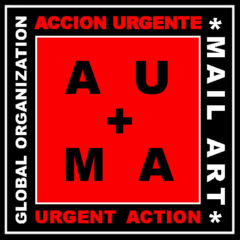At a cultural level, the dominance of the great powers is expressed in the imposition of their own values reaching all corners of the planet through the mass media, including the internet. The peoples and countries are dragged by the dynamics of globalization. It is about the second capitalist revolution. Economic globalization reaches everyone leaving aside democracies, sovereignties and borders, imposing the philosophy of „the greatest possible profit“. This brutal concentration of financial capital and power has expanded, among other things, thanks to the extraordinary development of communication technologies.
Precisely, that has been the historical goal of mail art: the „Eternal Network“ by Robert Filliou, the utopian project, perhaps unattainable, of the permanent communication of all through all available means, the eternal development of communication without limits. Tragic paradox, no doubt, because it has been thanks to this expansion of communications that capitalism has managed to impose its economic structure and its „culture of profit“ to the whole world. It has been the globalization of their lifestyles aimed at enrichment at any price, the globalization of absolute alienation, living outside ourselves for today’s Mollock, money via credit card. Of course, the Network of Filliou aims at the globalization of human values, today violated in almost all the world, for the sake of achieving a life in peace and enjoyment without the daily drama of living as animals behind a piece of bread in an environment impoverished by the savage exploitation of natural resources.
It would be strange, then, that cultural activity, as a productive activity of men, would be left out of these structural budgets. The gigantic conglomerates of the cultural industry are realizing their possible profitability: the big publishing groups, the business collution for musical diffusion, the mafias of the art market, the producers and cinematographic companies, etc. Far from contributing to the diffusion and enhancement of culture, these large concentrations of the cultural industry banalize and impoverish it because, now, the aesthetic or communication value does not count at all but its price in the art market in line with the ideological needs of the system. Price, logically, manipulated according to the lucrative interests of the publishing firm and the associated corporations.
Globalization and its concomitant phenomena do not pursue so much the conquest of countries, but the control of markets. It does not imply the conquest of territories but the possession of richness. At the cultural level it means the substitution of the local culture for the imperial one. Uses and customs, clothing, language, money, sports, history: the application of great standards that erase the differences between human groups, destroying diversity and differences. Paradoxically, this is another of the great goals of mail art: the achievement of a single language that makes us brothers and sisters and unites us above ethnic or economic differences. It is the „pen“ of Guillermo Deisler that „erases the borders“. Only that the brotherhood that promotes the first world and globalization is through the consumption of its products. As it reads in an advertisement: „Twinned in PEPSI“. Globalization not only ends with differences and diversity, but also humanity itself. While global food production has risen, by virtue of great technological advances, to 110% of the world’s needs, approximately 30 million people continue to die of hunger annually while another 800 million live in under-consumption.
When democracy and freedom are reborn in a world that has eliminated the worst authoritarian regimes, the censures and manipulations reappear the ghosts of the past, above all, the control of societies through the media: the numbness of consciences, to distance them from the „dangers“ of social action, to tolerate misery because of their „divine“ or „supernatural“ reason, the „laissez faire“, the cultivation of the personal garden (Voltaire), the concerns centered on the „I“ „and its aggrandizement (to the detriment of others, of course), etc.
Focusing the analysis towards „Our America“ as Martí said, the deterioration of the Nation-State is appreciated due to the second capitalist revolution, the globalization of the economy and the technological changes that are transforming the geopolitical environment. This policy requires a very strong influx of dollars into the domestic market and these come out, among other sources, such as unequal trade, eg, from the interests of foreign investments. At first glance the conflict between the military cost of imperial adventures and its declining economy coupled with the rise of opposition movements in some countries and the collapse of economies will probably make this fundamental contribution to the Treasury of the great powers very insecure (see the cessation of compulsory payments from Argentina).

There is no doubt that we are perhaps the weakest link in the imperial chain. Therefore, we need, today more than ever, an oiled „communication system“, at least on an artistic, competent and effective level, to disseminate and channel our demands (as it happened when the period of dictatorships). Hardly some institutions, still fragile, such as the World Social Forum, some political-social movements, some progressive government and some „non-governmental social organizations“ can offer us some point of support to spread those ideals. The Network may be the only way we have. We have been appreciating how, little by little, the iron law of capitalism has been ignoring the essential tacit rule of mail art, the rule that kept it in the area of “use value“ (that is, outside the area of “change value“). The rule that will immortalize the person who gave it verbal expression, Lon Spielgelmann: „Mail art and money do not mix“. Thus, mail art was constituted as an alternative cultural and artistic construction that points to the heart of the capitalist system by obstructing what holds it together: money. And, consequently, it denied the market and consumerism, by questioning its legitimacy.
In recent years we have witnessed the gradual commercialization of some genres of mail art, especially „artistamps“ (apocryphal postage stamps) and „rubberstamps“ (creative rubber stamps). The archives of deceased mail artists continue to flow into the great collections. We receive monthly „artistamps“ price lists and the tendency to offer prizes for participation increases. Likewise, exhibitions commissioned by Galleries and Museums continue to rise. However, the disruptive force of mail art is so great that, even this increase in professionalization does not affect its diffusion and growth. On the other hand, the greatest novelty of the current „Net Art“ (art in the electronic network) lies in the interactivity, naturally existing in mail art networks for more than 40 years, the Add and Pass.
Long before the deceased French sociologist, Pierre Bourdieu, advocated in 1992, the creation of an „intellectual international“ to confront the nefarious consequences of globalization with the union of all the intellectuals and artists of the world to fight the offensive of the transnationals of the culture, the networking or the network of artists of distance communication (as Edgardo Antonio Vigo called it) or mail art, had already raised the bases of a true art of the communication, where mercantile considerations were left aside and that, today, fructifies in the artistic interaction that has developed to the maximum the electronic arts, above all, computing through the internet. While the globalization that promoted the prevailing economic system tries to bring all the peoples of the world to the systematic and conspicuous consumption of its products, the „globalization“ that drives mail art seeks the establishment of communicational links with everyone pretending (utopically?) the unity of all peoples in a genuine, dignified and enriching dialogue.
Montevideo, Uruguay

